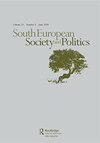推特与情感两极分化:追随西班牙政治领袖
IF 4.6
1区 社会学
Q1 POLITICAL SCIENCE
引用次数: 5
摘要
摘要本研究通过嵌入调查小组的准实验,探讨了Twitter上精英话语对公民情感两极分化的影响。在2019年西班牙欧洲议会选举期间,参与者被邀请关注来自主要政党的九名候选人的推特账户之一。使用网络跟踪数据(被动测量)确认参与者的实验依从性。结果表明,通过自我选择接触候选人的Twitter账户不会增加情感两极分化。尽管高度的两极分化可能有助于建立回音室,但党派推特账户中包含的两极分化内容对日益加剧的情感两极分化没有影响,即使在那些强烈认同这些政党的人中也是如此。这一发现证实了所谓的社交媒体有限媒体效应假说。本文章由计算机程序翻译,如有差异,请以英文原文为准。
Twitter and Affective Polarisation: Following Political Leaders in Spain
ABSTRACT The present study addresses the effect of the discourse of elites on Twitter on citizens’ affective polarisation through a quasi-experiment that was embedded in a survey panel. Participants were invited to follow one of the Twitter accounts of nine candidates from the main political parties during the 2019 European Parliament electoral campaign in Spain. Experiment compliance among participants was confirmed using web-tracking data (passive metre). The results show that exposure to candidates’ Twitter accounts by self-selection does not increase affective polarisation. Although high levels of polarisation might contribute to building echo chambers, the polarising content contained in the partisan Twitter accounts has no effect on increasing affective polarisation, even among those who strongly identify with such parties. This finding confirms the so-called limited media effect hypothesis for social media.
求助全文
通过发布文献求助,成功后即可免费获取论文全文。
去求助
来源期刊

South European Society and Politics
Multiple-
CiteScore
5.80
自引率
21.20%
发文量
14
期刊介绍:
A leading point of reference for scholars of Southern Europe, South European Society and Politics promotes both comparative and inter-disciplinary analyses, as well as offering innovative single county and sub-national studies. The journal acts as a forum for social, economic, cultural, contemporary historical and political approaches to research on the region, and is particularly keen to sponsor policy–focused studies in all these disciplines. The journal publishes research articles; South European Atlas with election reports and articles on other subjects of topical interest, and an extensive book reviews section, including both review articles and individual book reviews.
 求助内容:
求助内容: 应助结果提醒方式:
应助结果提醒方式:


